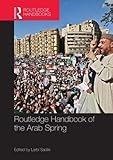Routledge handbook of the Arab Spring : rethinking democratization / edited by Larbi Sadiki.
Material type: TextPublisher: London ; New York, : Routledge, 2015Description: xxxviii, 679 pages : illustrations ; 25 cmContent type: text Media type: unmediated Carrier type: volumeISBN: 9780415523912 (hardback)Subject(s): Arab Spring, 2010- | Revolutions -- Arab countries -- History -- 21st century | Democratization -- Arab countries -- History -- 21st centuryDDC classification: 909/.097492708312 LOC classification: JQ1850.A91 | .R68 2015Other classification: POL000000 | POL007000 | SOC053000 Summary: "The self-immolation of Mohammed Bouazizi in Tunisia in December 2010 heralded the arrival of the 'Arab Spring,' a startling, yet not unprecedented, era of profound social and political upheaval. The meme of the Arab Spring is characterised by bottom-up change, or the lack thereof, and its effects are still unfurling today. The Routledge Handbook of the Arab Spring seeks to provide a departure point for ongoing discussion of a fluid phenomenon on a plethora of topics, including: - Contexts and contests of democratisation - The sweep of the Arab Spring - Egypt - Women and the Arab Spring - Agents of change and the technology of protest - Impact of the Arab Spring in the wider Middle East and further afield Collating a wide array of viewpoints, specialisms, biases, and degrees of proximity and distance from events that shook the Arab world to its core, the Handbook is written with the reader in mind, to provide students, practitioners, diplomats, policy-makers and lay readers with contextualization and knowledge, and to set the stage for further discussion of the Arab Spring"-- Provided by publisher.
TextPublisher: London ; New York, : Routledge, 2015Description: xxxviii, 679 pages : illustrations ; 25 cmContent type: text Media type: unmediated Carrier type: volumeISBN: 9780415523912 (hardback)Subject(s): Arab Spring, 2010- | Revolutions -- Arab countries -- History -- 21st century | Democratization -- Arab countries -- History -- 21st centuryDDC classification: 909/.097492708312 LOC classification: JQ1850.A91 | .R68 2015Other classification: POL000000 | POL007000 | SOC053000 Summary: "The self-immolation of Mohammed Bouazizi in Tunisia in December 2010 heralded the arrival of the 'Arab Spring,' a startling, yet not unprecedented, era of profound social and political upheaval. The meme of the Arab Spring is characterised by bottom-up change, or the lack thereof, and its effects are still unfurling today. The Routledge Handbook of the Arab Spring seeks to provide a departure point for ongoing discussion of a fluid phenomenon on a plethora of topics, including: - Contexts and contests of democratisation - The sweep of the Arab Spring - Egypt - Women and the Arab Spring - Agents of change and the technology of protest - Impact of the Arab Spring in the wider Middle East and further afield Collating a wide array of viewpoints, specialisms, biases, and degrees of proximity and distance from events that shook the Arab world to its core, the Handbook is written with the reader in mind, to provide students, practitioners, diplomats, policy-makers and lay readers with contextualization and knowledge, and to set the stage for further discussion of the Arab Spring"-- Provided by publisher.
| Item type | Current library | Call number | Status | Date due | Barcode |
|---|---|---|---|---|---|
 Books
Books
|
The BIAA David H. French Library Shelf 26 - Main Room | A8 SADIK 30236 | Not for loan | BOOKS-000000023154 |
Includes bibliographical references and index.
"The self-immolation of Mohammed Bouazizi in Tunisia in December 2010 heralded the arrival of the 'Arab Spring,' a startling, yet not unprecedented, era of profound social and political upheaval. The meme of the Arab Spring is characterised by bottom-up change, or the lack thereof, and its effects are still unfurling today. The Routledge Handbook of the Arab Spring seeks to provide a departure point for ongoing discussion of a fluid phenomenon on a plethora of topics, including: - Contexts and contests of democratisation - The sweep of the Arab Spring - Egypt - Women and the Arab Spring - Agents of change and the technology of protest - Impact of the Arab Spring in the wider Middle East and further afield Collating a wide array of viewpoints, specialisms, biases, and degrees of proximity and distance from events that shook the Arab world to its core, the Handbook is written with the reader in mind, to provide students, practitioners, diplomats, policy-makers and lay readers with contextualization and knowledge, and to set the stage for further discussion of the Arab Spring"-- Provided by publisher.
